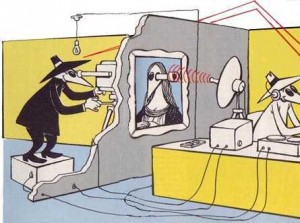
by John Amaruso
Yesterday President Obama released a written statement addressing his concerns over the H.R. 4310 bill, also known as the “National Defense Authorization Act” or NDAA. The bill which contains over 680 pages of various appropriations to military personnel and vital security programs, was originally signed into law for the fiscal year 2012. It has been approved again for this fiscal year 2013. While a majority of it’s provisions are mundane and maintain essential military protocol, there are sections of the bill which many civil liberty unions and activists alike see as violating the constitutional rights of the American citizenry including serious abuses like indefinite detainment.
The President who had vocalized his reservations when first signing the bill in 2012, has doubled down on his prudence by releasing a written memo, stating each section he sees as unnecessary, unlawful and counter productive. Below I have outlined a few key sections President Obama has made a point of addressing in the statement.
Paragraph 3: “…restrictions on the Defense Department’s ability to retire unneeded ships and aircraft will divert scarce resources needed for readiness and result in future unfunded liabilities.”
Defined: The bill rejects retiring outdated products such as fighter jets/naval ships which are unnecessary in today’s contemporary wars. AKA we are spending money on frivolous expenditures while neglecting priorities for out military men and women.
Paragraph 5: “Section 1025 places limits on the military’s authority to transfer third country nationals currently held at the detention facility in Parwan, Afghanistan… Decisions regarding the disposition of detainees captured on foreign battlefields have traditionally been based upon the judgment of experienced military commanders and national security professionals without unwarranted interference by Members of Congress.”
Defined: Enemy combatants/prisoners of war have always been dealt with by military leaders according to mission goals/ultimate defined ends. By leaving this authority to Members of Congress, the whim of public opinion on elected officials could lead to brazen and unwise choices made by career politicians who seek nothing more than to be re-elected. Free of this burden, military leaders can make the harsh and necessary decisions void of the sway of often irrational public opinion.
Paragraph 6: “Section 1027 renews the bar against using appropriated funds for fiscal year 2012 to transfer Guantanamo detainees into the United States for any purpose.”
Defined: While there was a huge backlash against the executive branch’s desire to try terrorists in Federal court, there is a necessary and vital function of this. Federal court is a viable and effective setting to try and convict the enemies of the United States. It may well be the last legal channel in which this could happen. By disallowing this, in essence Guantanamo Bay remains as the only possible location for these detainees, hence the continuation of it’s operations despite President Obama’s election campaign promise of closing down the controversial camp. Not to mention this violates the separation of powers clause. Section 1028 continues this, hampering the executive branch’s ability to transfer detainees to foreign countries in an attempt to hinder the President’s plan of shutting down Guantanamo Bay.
Expanded Powers for Indefinite Detainment Today
 While these remain legitimate concerns and problems for the President and his counter-terrorism forces, there is one issue he has failed to address; Section 1021 which gives the military authority to detain any American citizen indefinitely without rights of habeas corpus. President Obama in a signing statement declared that his administration would not abuse that authority.
While these remain legitimate concerns and problems for the President and his counter-terrorism forces, there is one issue he has failed to address; Section 1021 which gives the military authority to detain any American citizen indefinitely without rights of habeas corpus. President Obama in a signing statement declared that his administration would not abuse that authority.
It sure is reassuring now that the President says he won’t abuse this power handed to him by the Congress… but what about the next guy? There will be a new President in 2016, may he be Republican, Democrat, maybe (I inject the utmost optimism) even a third party candidate. As long as this law remains on the books, successive leaders and officials could take advantage of such unprecedented powers. History shows us that this much more likely to happen than not.
Once a right is taken away, it is much harder to take it back. As shown by the signing of the NDAA, our rights to ourselves and our liberty are being undermined by the Pentagon and Congress. It’s the ability of Congress and elected leaders to essentially “sneak in” a tiny provision into a 1000 page bill that frightens me and most freedom loving people around the world. If such a maneuver is lawful, what is stopping Congress from pulling the rug out from under us? These insidious means to strip away our rights makes it possible for Congress to design a necessary funding bill or law while sneaking in a line or two. In essence, Congress can hold the country hostage to it’s will if it so pleases…
Wait a second…
Leave a Reply